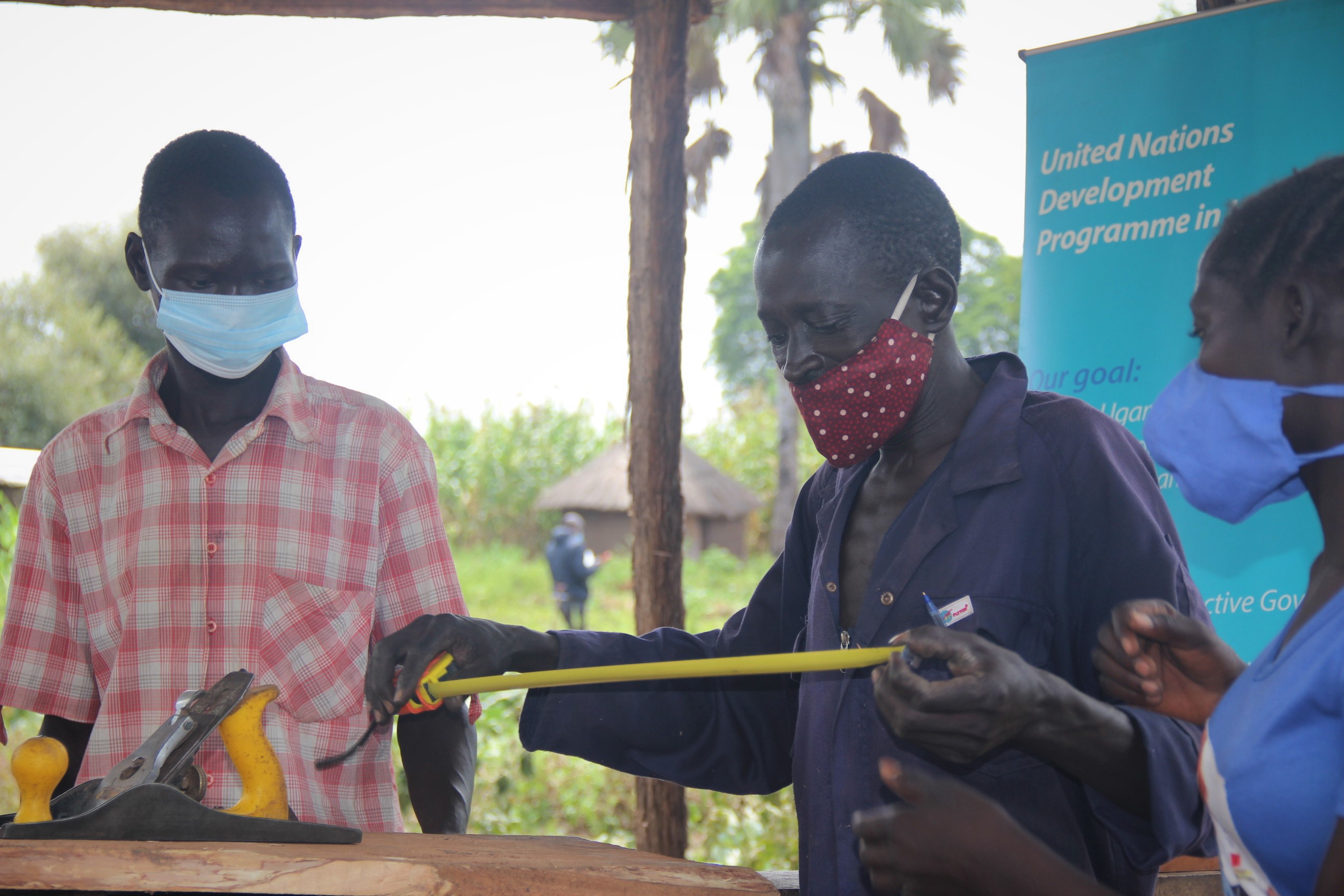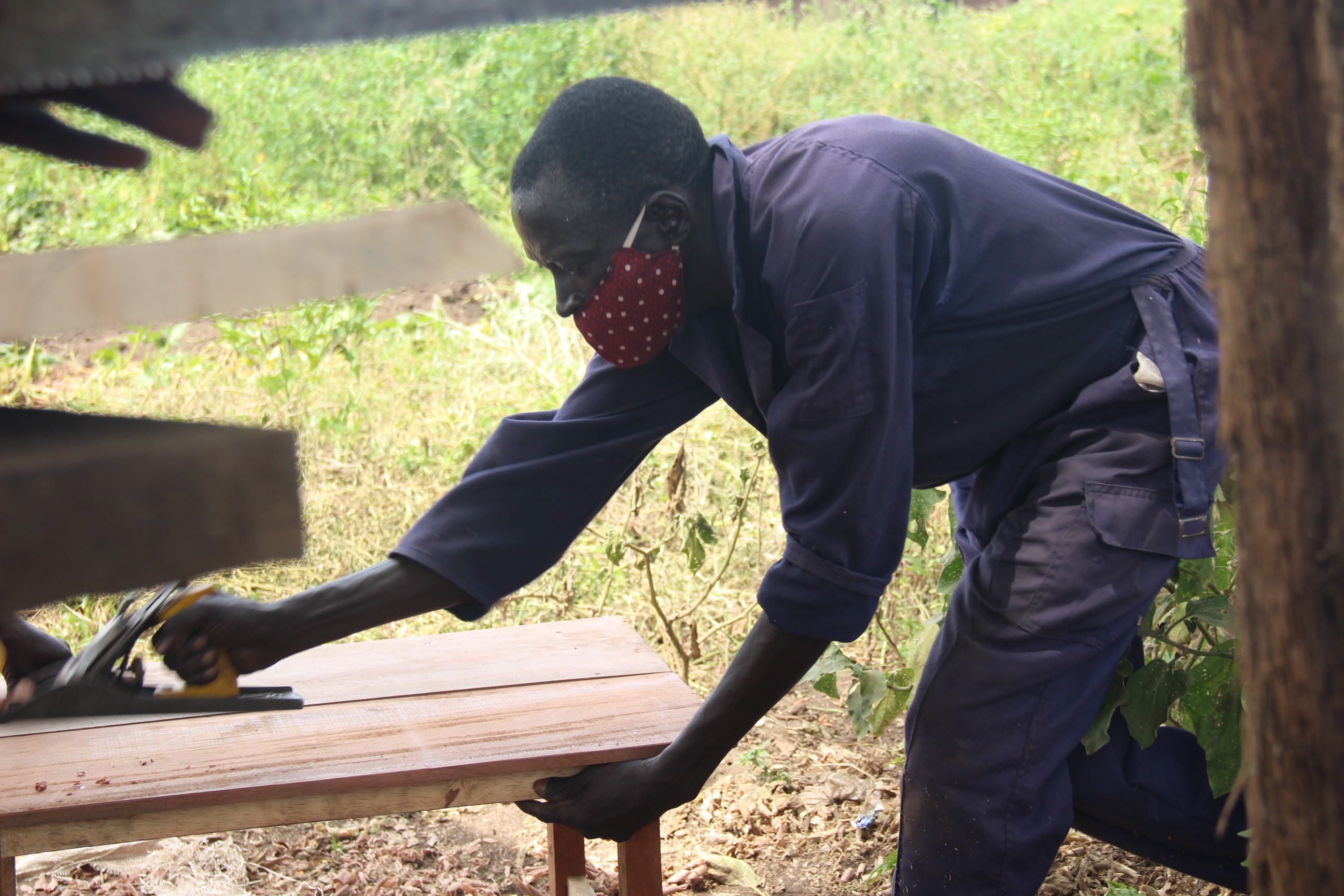Mr. Lou Charles (middle) and his colleagues at work. Lou underwent carpentry and joinery training for three months and later used the skills and earnings to start a carpentry workshop that employs other youth.
Since 2019, the United Nations Development Programme (UNDP) and the Government of the Republic of Korea, through the Korea International Cooperation Agency (KOICA) have been implementing a project designed to unlock the economic capacities of women and youth in refugee and host communities in Northern and West Nile Regions with a focus on Adjumani, Lamwo and Obongi districts. Now in its final year of implementation, the Uganda Host and Refugee Community Empowerment Project 2019-2022 has created economic opportunities in communities and impacted the lives of many who have fled from war, violence, conflict or persecution to find safety in Uganda, giving them a fresh start at life.
The project is implementing schemes for emergency employment, vocational training, value chain development and structured community mobilization and messaging to empower people and address the root causes of gender inequality and gender-based violence (GBV). The project is implemented as part and contributes to the current UNDP Emergency Response and Resilience Strategy, based on the Humanitarian Development and Peace (HDP) Nexus and Refugee and Host Population Empowerment (REHOPE) Frameworks of United Nations and Comprehensive Refugee Response Framework (CRRF) of the Government of Uganda.
By December 2021, this project had disbursed UGX 2.4 billion via cash-for-work activities and supported 10,040 beneficiaries, surpassing the total target beneficiary number of 7,200. The project also established 341 Village Saving and Loans Associations (VSLAs) and facilitated micro, small and medium enterprises (MSMEs) with start-up business grants. The total grants disbursed is UGX 700 million for 3,037 individual MSME owners/starters, with various trainings in business skills, financial literacy, and vocational training for youth having also been provided.
The project is now entering the second stage of value chain development/improvement to boost the local economy and give better business opportunities after emergency support (Phase I) and business recovery (Phase II).
Individual start-up business grant: Jennifer’s Story
Individual beneficiaries have different accounts of how the project has impacted their lives. Ms. Jennifer Foni, 40, fled to Uganda in 2016 from South Sudan and temporarily settled in Nyumanzi Reception Center of Nyumanzi settlement, later moving to Maaji II settlement in Adjumani District. During her stay in the various settlement camps, Foni, a single mother of 8 children has tried different income generating activities ranging from selling vegetables, running a grocery shop, growing crops, woodlot planting and road construction.
Foni participated in woodlot and road construction as part of the project’s cash-for-work activities, earning UGX 11,000 (about USD 3) daily. She used the earnings to strengthen her business (food items) which steadily picked up and has since expanded into a full-fledged kiosk selling fruits and general groceries.
Ms. Jennnifer Foni at her shop
She has also undergone several financial literacy and business skills trainings held as part of the project offer which have enhanced her business acumen and improved her savings and financial discipline. Now Foni dedicates a generous amount to savings in two Village Savings and Loan Association (VSLA) groups in her area. These groups have impacted her life financially but also socially,
“I have made friends in our savings group and improved my earnings. We are like a family and support each other in times of need,” said Foni.
Ms. Jennifer Foni sells slippers to a customer at her shop
From the business, Foni earns between UGX 400,000-600,000 per month with a net profit of about UGX 200,000. From these earnings, Foni meets her home basic needs such as food, transport and school fees and medication for her children.
Group start-up business grant: Modern Hybrid Group in Poultry Business
The project also supported 221 group businesses to start or scale up, one such business being the Modern Hybrid Group in Obongi District. The group comprises 18 members (5 males, 13 females), all refugees from South Sudan, and was formed as a VSLA after participating in Pasu road opening and woodlot planting in March 2021. Since the group was established, members have saved group business money from cash-for-work income and also received a business grant of UGX 8 million for the poultry business. They initially bought 150 chicks and have sold 50 birds so far, remaining with 100 which they are selling to the local community. The group plans to expand the business buying 400 more chicks as well as starting up market vending, goat rearing, and petty trades in 2022.
Ms. Keliki Lilian feeding her poultry birds
Ms. Lilian Keliki, a member of Modern Hybrid Poultry Business Group, is 35-year-old from South Sudan with seven children. She arrived in Uganda in 2017 wholly dependent on food rations provided for in the refugee camps which she said were not enough for her family. Later she was selected to take part in woodlot planting and crop growing which has transformed her life.
“My children became healthier after I participated in the project,” she said. “I used the money from cash-for-work and put it into the savings groups. I participated in the group business and I was in charge of feeding chicks. I could earn extra money to support my children. We can now afford two meals a day unlike in the past when we had only one meal.”
“I also took the psychosocial support from the project and learned how to manage the problems and disturbing memories I carried from the past during the war in South Sudan. It helped me to take care of my children well. I feel stronger than before mentally and physically.”
Other beneficiaries welcomed the diversification to include crop and animal husbandry, saying that it is difficult to earn money only with crop planting in Obongi because of flooding.
Vocational Training – Carpentry: Charles’ Story
Charles Lou, 40, underwent carpentry and joinery for three months and later used the skills and earnings to start a carpentry workshop. A South Sudanese national, Lou and his colleagues used to spend most of their time on games before the TVET training. Now they are involved in productive and income generating activities. Lou also recounts difficulties in providing for his family of eight children and two wives before the project,
“I used to rely on my wife who by that time was selling food items in the market. This was so hard for me because I was incapable of supporting my family financially,” said Lou, adding that the vocational training he attended was a game changer. After the training, Lou engaged in woodlot planting, a cash-for-work activity where he earned UGX 400,000 (about USD 114) cash that he used to start a carpentry workshop at his home specializing in making beds, tables, doors and cupboards.
Mr. Lou Charles making a table at his furniture workshop
“It costs me about UGX 38,000 (USD 10) to buy the necessary items to make items such as tables which I sell at UGX 70,000 (USD 20) giving me a profit of about UGX 32,000 (about USD 9.). Lou adds that every month he makes an overall profit of between UGX 120,000 (USD 34) and UGX 150,000, (USD 42) making and using this money to save in VSLAs, take care of his family and expand his business.
Today, Lou’s carpentry employs two people and plans to teach more members the skills he acquired. He however calls for longer vocational training citing challenges in capacity building with the shorter trainings.
“I appreciate the vocational training; however, the three months are not enough to acquire all the skills. There are some items we are unable to make because we are incapacitated by the skills that we have.”

 Locations
Locations




